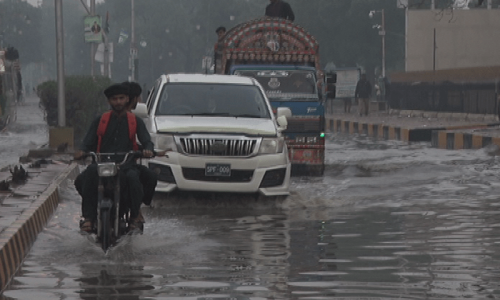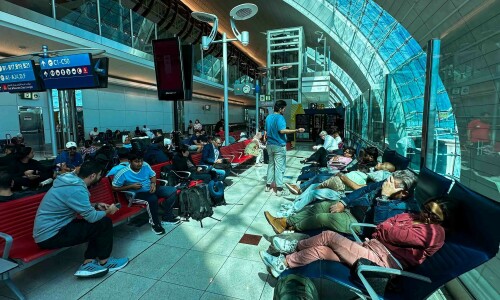In April 2019, three Pakistani women set out on a journey to collect climate change narratives from communities all across the country. Our team – comprising an environmental scientist, an educationist and a documentary filmmaker – had just won a grant from the National Geographic Society. This grant allowed us to observe how ordinary people in Pakistan are being affected by climate change and how communities are tackling it. Pakistan is one of the countries most vulnerable to climate change.

As a documentary filmmaker I am used to traveling in the country either on my own, or with teams that have both men and women working together. However, this project was my first time ever working with an all-woman team for such an extended period of time and the experience turned out to be quite different. It turns out that in Pakistan if three women traveling together are unaccompanied by a man, they will still be called teen akeli larkiyaan (three lone girls).

Being a young all-woman team also means that like everywhere else in the world, you will not be taken seriously enough and you would certainly be mansplained to. There was an instance in our fieldwork when a gentleman at a certain NGO’s office was bombarded with a series of curious questions by us and when he began running out of answers he said to us, “It looks like you people have just ended up here from Karachi without doing any prior research!” We were stunned and one of us firmly replied to him, “Sir, can you please not underestimate our research and answer our questions?” This was followed by an awkward silence after which the official gave us all the information we needed.
Early on in our research, we also began observing an interesting pattern. In order to get access into communities, we would first contact a focal person there. These focal persons were always men, and when we would request them to help us meet community members from their area they would only arrange our meetings with other men there.
We were in Reshun Valley, Chitral when we met a young banker named Sonia when I was photographing an area devastated by the flood. She simply walked towards us with her younger sister and we began conversing.
Listening to her changed our entire perspective completely. Sonia spoke about the gut wrenching sound of the flood just before it hit her village, and she kept hearing the sounds in her head months after the flood had passed. She explained how she and her cousins had to rebuild new, smaller houses on the other side of the river because the flood had literally eaten away the land their homes were built on; and as a result of this displacement familial ties had gotten negatively affected because the sense of togetherness was gone. She spoke about trauma, loss, nostalgia and memories of her old home and farmland in a way no man had spoken to us before, and that is when we fully realized how well-rounded one’s research can be if researchers make an effort to talk to more women.
After this heart touching encounter, we began demanding people politely to help us talk to the women in any community we went to. In our interactions, it was women who also knew more about folklore, songs about the weather and other forms of indigenous knowledge in different languages as compared to men.
They say when you travel, your long held stereotypes about people and places break. That was true for us too, except for one stereotype that ended up being reinforced instead in our case. It is the stereotype of men’s inability to take directions when on the road. From the desert of Nagarparkar to the plains of Okara and the mountains of Chitral, we found all our otherwise amazing drivers to be resistant towards asking for directions even if they were lost in a place they had never visited before and there were local pedestrians on the road who could have easily guided us. This became a running joke of sorts during this journey.
In J.K. Rowling’s Harry Potter and the Deathly Hallows, Albus Dumbledore said, “Help will always be given at Hogwarts to those who ask for it.” When I look back at this particular travel experience, I feel the quote applies fully to Pakistan as well. Especially in the mountains, there were several instances where help seemed to arrive out of nowhere. We had a flat tyre in the middle of a completely deserted road outside of Laspur, Chitral and our amazing driver Ahmed bhai had just started to fix it when a man in another vehicle stopped for us. While Ahmed bhai continued to do his work, this man kept giving him a helping hand. When the job was done, he told us, “I’m now going to drive slowly behind you guys till you’ve crossed the Shandoor Pass, just in case you need more help.” He could have conveniently overtaken us and driven ahead, but he chose not to.
Another such person was Riza Ali who we met in Badswat situated in the Ishkoman Valley of District Ghizer. We had come to Badswat after a six hour long, extremely difficult drive to see the aftermath of the submersion of an entire village under a newly formed lake due to a glacial lake outburst flood (GLOF). There was no phone reception there, and no human being in sight all around the vast expanse of the lake. It felt like a scene out of an apocalyptic film in which everything and everyone had been decimated.
We walked around the place, I took photographs, we began trekking upwards on foot and the area continued to appear fully uninhabited. And then suddenly, from the back of one of the mountains in the distance emerged a group of men who kept walking towards us. One of them was a lean, young man named Reza Ali. After we initiated a conversation with the men, Reza told us, “I could see you from the distance and it seemed like you needed help.” Reza worked with us the entire day without any expectation of reward, helping us to talk to as many people in the area as he could and then fed us a generous supper at his home before he finally allowed us to say goodbye to him.
However, our biggest take home learning on the Climate Stories Pakistan journey has been that this unparalleled warmth, kindness and hospitality from people like Reza should not be misconstrued as a sign of overall prosperity. As a team hailing from Karachi, our ideas of affluence could have left us misguided had we not paid enough attention in the field, especially while visiting the mountainous regions of northern Pakistan. This is because if you walk into any home there, you will observe elements that an urbanite can only dream of: fruit trees in the home garden, open and airy spaces, pure and unadulterated food, and clean water. It would have been quite easy for us to take the hospitality and apparent abundance at face value had we not made the effort to deeply investigate what their lives and their challenges were actually like.
You can follow the entire Climate Stories Pakistan journey on Facebook and on Instagram.
This article was originally published on The Third Pole and has been reproduced with permission.
















































